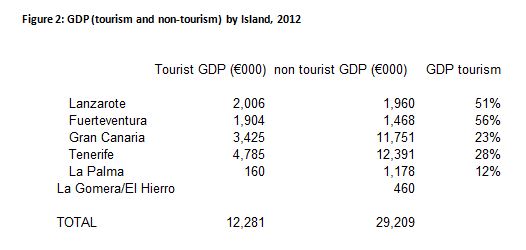The generally accepted measure of wealth creation is Gross Domestic Product (GDP), so this post will use various sources of information to calculate the proportion of GDP for each island that tourism creates.
Figures for GDP and the Canary Islands as a whole are widely published. For 2012, the figures were as follows:
| Canary Islands GDP (€000) |
€41,490 |
| Tourism GDP (€000) |
€12,281 |
| Percentage due to Tourism |
29.6% |
So, overall, 30% of the islands’ GDP is attributable to tourism. But how does this break down for the individual islands? We would expect tourism to contribute much more to the GDP of Lanzarote (LZ) and Fuerteventura (FU) since their resident populations are much smaller and therefore domestic economic activity will be rather lower than on Tenerife (TF) and Gran Canaria (GC).
The unit we will use to measure the contribution of tourist is a guest night (i.e. one tourist staying one 24 hour period). Figure 1 demonstrates how the tourist population compares to the resident population of each island
Figure 1: Contribution of Guest Nights to the Resident Population
For example, in the case of Lanzarote, the average number of tourists on the island at any one time was around 48,800 and accounted for 26% of the total population, including tourists “resident” on the island.
The total number of guest nights in the Canary Islands in 2012 was around 109 million; this is equivalent, in GDP terms, to €0.11 per guest night. This allows us to calculate the total GDP attributable to tourism for each island.
For non tourism GDP, the figure seems to vary well with the population of each island. So, breaking out non-tourist GDP, we get the following results:
Figure 2: GDP (tourism and non-tourism) by Island, 2012
So, as expected, tourism is much more important to wealth creation on LZ and FU than on GC or TF.
If we look at the two major markets on LZ (UK) and FU (Germany), these two groups alone contribute a very large chunk to their respective economies:
Given the crucial role that tourism plays in Lanzarote, especially British tourism, it is perhaps astonishing that the British expatriate community, which is a vital element in promoting good holiday experiences of British tourists on the island, is effectively uninvolved with decision-making nor is barely consulted.




